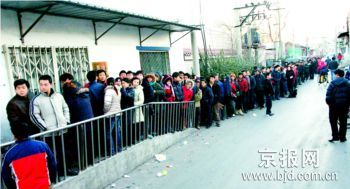“Temporary residence”的版本间的差异
来自China Digital Space
| 第1行: | 第1行: | ||
暂住 (zàn zhù): temporary residence | 暂住 (zàn zhù): temporary residence | ||
| − | The state of “temporary residence” refers to permission that some Chinese must obtain to work or live in [http://zh.wikipedia.org/zh-cn/%E6%9A%82%E4%BD%8F%E5%88%B6%E5%BA%A6 21 cities in China]. Those in the cities without a temporary residence permit may be fined or deported. The temporary residence permits are of questionable legality because a similar national system of temporary residence permits has been abolished, and many scholars find cities’ current systems of temporary residence permits to be unconstitutional. However, notable among those cities that retain the system of temporary residence permits are Beijing and Shanghai, which claim the permits are necessary to impose order. Some cities have changed the name of the permits from “temporary residence permit” to “residence permit” while retaining the same basic system. | + | The state of “temporary residence” refers to permission that some Chinese must obtain to work or live in [http://zh.wikipedia.org/zh-cn/%E6%9A%82%E4%BD%8F%E5%88%B6%E5%BA%A6 21 cities in China]. Those in the cities without a temporary residence permit may be fined or deported. While the disparity in development between China's countryside and urban areas has made it [http://chinadigitaltimes.net/2010/09/booming-china-migrant-misery/ economically necessary for many rural residents] to live as temporary residents in large cities, the permit system prevents them from enjoying the same privileges and rights as those originally from the cities. |
| + | |||
| + | The temporary residence permits are of questionable legality because a similar national system of temporary residence permits has been abolished, and [http://chinadigitaltimes.net/2006/12/temporary-residence-permit-system-illegal-guo-qiang/ many scholars find cities’ current systems of temporary residence permits to be unconstitutional]. However, notable among those cities that retain the system of temporary residence permits are Beijing and Shanghai, which claim the permits are necessary to impose order. Some cities have changed the name of the permits from “temporary residence permit” to “residence permit” while retaining the same basic system. | ||
[[File:temp res.jpg|400px|thumb|left|''People lining up in front of a police station in Beijing in 2008. Before the Olympics, Beijing stepped up its enforcement of temporary residence permits.'']] | [[File:temp res.jpg|400px|thumb|left|''People lining up in front of a police station in Beijing in 2008. Before the Olympics, Beijing stepped up its enforcement of temporary residence permits.'']] | ||
2013年6月9日 (日) 18:06的版本
暂住 (zàn zhù): temporary residence
The state of “temporary residence” refers to permission that some Chinese must obtain to work or live in 21 cities in China. Those in the cities without a temporary residence permit may be fined or deported. While the disparity in development between China's countryside and urban areas has made it economically necessary for many rural residents to live as temporary residents in large cities, the permit system prevents them from enjoying the same privileges and rights as those originally from the cities.
The temporary residence permits are of questionable legality because a similar national system of temporary residence permits has been abolished, and many scholars find cities’ current systems of temporary residence permits to be unconstitutional. However, notable among those cities that retain the system of temporary residence permits are Beijing and Shanghai, which claim the permits are necessary to impose order. Some cities have changed the name of the permits from “temporary residence permit” to “residence permit” while retaining the same basic system.







